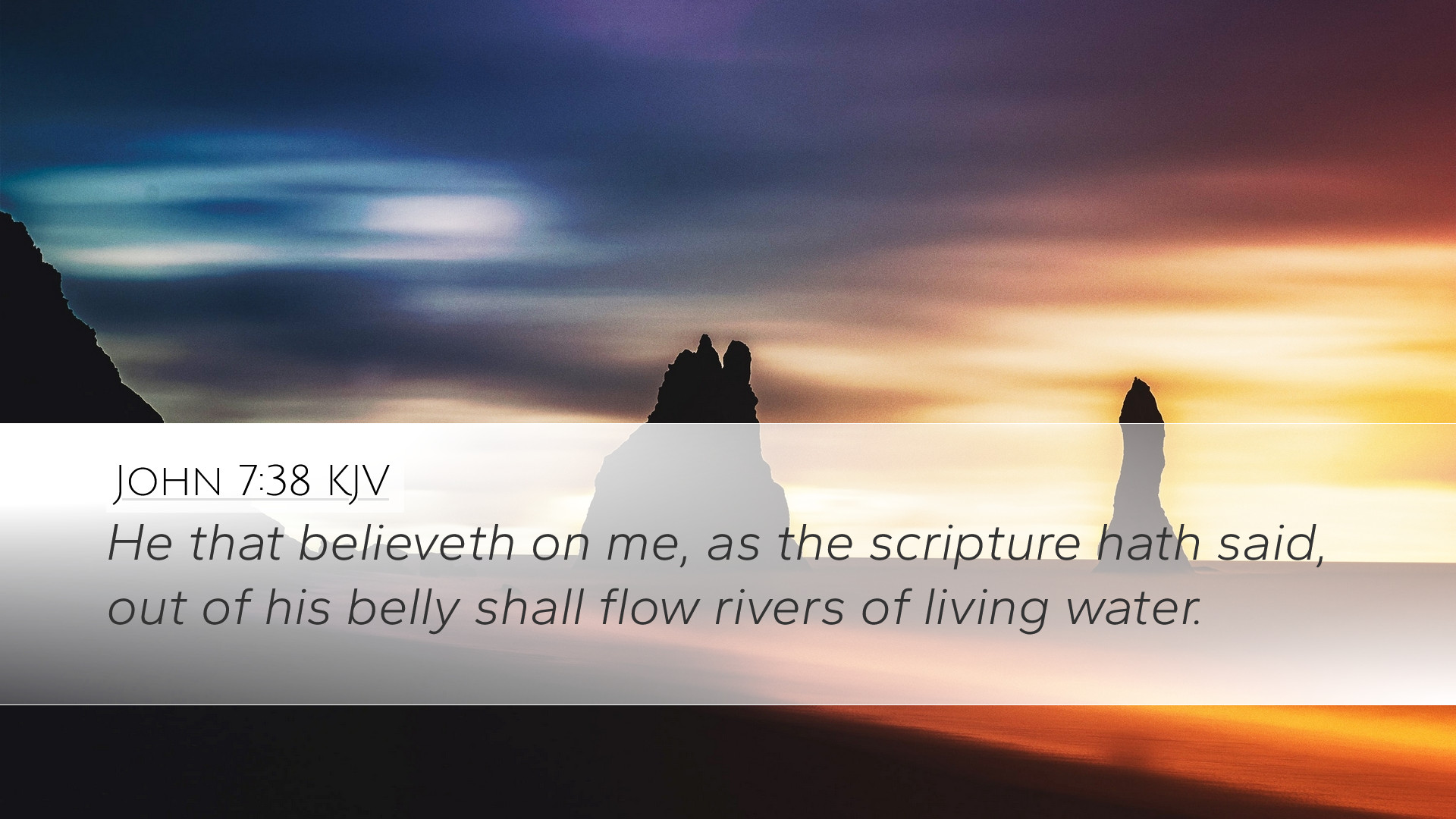Commentary on John 7:38
Verse Context: John 7:38 states, "Whoever believes in me, as Scripture has said, rivers of living water will flow from within them." This verse is significant as it encapsulates key theological themes of belief, the nature of Christ, and the promise of the Holy Spirit.
Exegesis and Theological Insights
This verse occurs during the Feast of Tabernacles, a time when the Jews celebrated God’s provision. Jesus uses this moment to declare His identity and the spiritual reality of those who believe in Him. The imagery of "living water" invokes the prophetic background found in the Old Testament, particularly in places such as Isaiah 44:3 and Ezekiel 47:1-12.
The Promise of Living Water
Matthew Henry emphasizes that Jesus speaks to the inward transformation that occurs when one believes in Him. He illustrates that the "living water" signifies the Holy Spirit, which He would later send to dwell within believers. Henry notes that this water is not stagnant but flows continuously, illustrating the dynamic and life-giving nature of the Spirit in a believer's life.
The Requirement of Belief
Adam Clarke points out that the condition for receiving this living water is belief. Clarke elaborates that it is through faith in Christ that believers can access this divine resource. This belief is not merely intellectual assent but entails a deep, personal trust in Jesus as the source of life and sustenance.
The Flow of Rivers
Albert Barnes interprets the "rivers" as representing abundance. He suggests that the flow of these rivers signifies both the overflow of spiritual blessings and the evangelistic impact that believers have on the world around them. Just as rivers bring life and nourishment, the outpouring of the Holy Spirit in a believer’s life should result in an outpouring of that life into the lives of others.
Historical Context
Understanding the cultural and historical background of the Feast of Tabernacles sheds light on this verse. The water-pouring ritual, which involved the collection of water from the Pool of Siloam, was symbolic of God’s provision and the hope of future salvation. In this ritual's context, Jesus’ proclamation of “living water” takes on profound significance as He claims to be the ultimate source of spiritual hydration and sustenance.
Symbolism of Water
Throughout Scripture, water is a symbol of cleansing, life, and the Spirit. The connection between physical water and spiritual life is a recurring theme. For instance, in the Mosaic Law, purification rituals involved water, and Isaiah prophesies that God would pour out His Spirit like water upon His people. Therefore, Jesus draws upon this rich tapestry of meaning to assert His identity as the Messianic source of eternal life.
Pastoral Applications
- Encouragement for Believers: Pastors can remind congregants that this promise is available to all who believe, reinforcing that the Holy Spirit's presence is not limited by social, economic, or cultural barriers.
- Invitation to Evangelism: The imagery of rivers flowing emphasizes our call as believers to share the Gospel. This divine flow should lead to an overflow of love, joy, and truth that reaches all people.
- Spiritual Vitality: The concept of living water can serve as a metaphor for spiritual health and vitality. Encouraging believers to continually seek the Holy Spirit’s filling is vital in spiritual formation.
Conclusion
In summary, John 7:38 serves as a rich theological declaration of Jesus' role as the giver of the Holy Spirit to those who believe in Him. The intersection of belief, the outpouring of the Holy Spirit, and the resulting impact on the world is a theme that resonates deeply within Christian theology. Through the insights provided by Matthew Henry, Adam Clarke, and Albert Barnes, we are called to understand both the depth and breadth of this promise, recognizing that it invites us into a transformative relationship with Jesus that flows out into a world in need of His living water.


